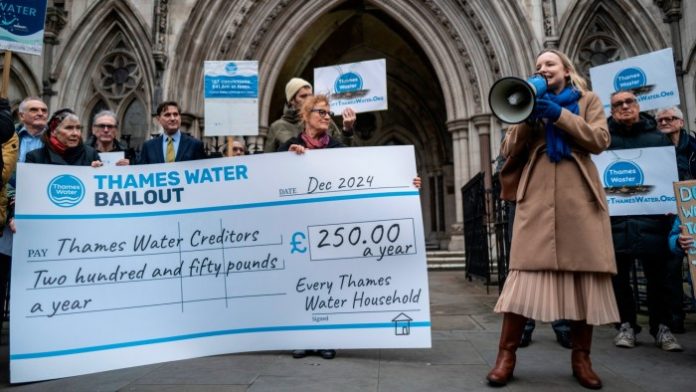Unlock the Editor’s Digest for free
Roula Khalaf, Editor of the FT, selects her favourite stories in this weekly newsletter.
Thames Water’s rival classes of bondholders took aim at one another in a London high court hearing, in which the troubled utility set out its case for taking an emergency loan of up to £3bn from its top-ranking lenders.
Junior bondholders claimed in written documents submitted to Tuesday’s hearing that the company’s more senior creditors were “holding [Thames Water] to ransom” through the onerous terms of their “extremely expensive” loan, which they argued was “having a chilling effect” on the utility’s parallel attempts to raise equity from new investors.
The court hearing, which Thames Water said was “urgent”, is the first step by the UK’s largest water and sewerage company to gain court approval for borrowing up to £3bn from its top-ranking “class A” bondholders. Without it, the company, which has a near-£19bn debt pile, “will run out of available liquidity on 24 March 2025”, according to court documents.
The loan is part of the utility’s attempt to avoid being temporarily renationalised under the government’s special administration regime. Thames Water serves 16mn people in and around London.
The loan proposal has led to an increasingly acrid spat between the company and its lower-ranking bondholders, which claim that the utility has not properly considered their rival offer of an equivalent £3bn loan at cheaper cost and more advantageous terms.
These so-called class B bondholders are now looking to challenge proceedings and launch their own parallel restructuring plan, which lawyers say will be the first time a judge has been asked to consider rival proposals since the new restructuring regime Thames Water is utilising came into force in 2020.
Thames Water’s barrister told the court on Tuesday that the proposed loan was “not itself a comprehensive solution to Thames Water’s financial difficulties”. Instead, Thames Water is borrowing the money in order to extend its liquidity until the regulator, Ofwat, determines how much it and other water companies can raise customer bills by. That determination is scheduled for Thursday.
For their part, senior bondholders described their rival group’s proposal as an “unimplementable distraction to further its own interests”.
A barrister representing the class A creditors told the court that arguments that their loan would have a chilling effect on Thames Water’s planned parallel equity raise “seem implausible”, while arguing that the junior bondholders were simply looking to “draw out the timeline” in proceedings in the hope of “improving their position”.
As well drawing the ire of junior bondholders, the class A loan proposal has also attracted criticism from campaigners, academics and experts, who have hit out at the loan’s high 9.75 interest rate and other charges that could cost the utility as much as £800mn over 2.5 years.
A group of campaigners staged a protest outside the Royal Courts of Justice on Tuesday, calling on environment secretary Steve Reed to “block the High Court signing off a Thames Water bailout”.
Oxfordshire-based charity Windrush Against Sewage Pollution also wrote a letter to the court last week asking for evidence to be considered on behalf of Thames Water’s bill payers, which the group argued have “no say” in proceedings despite being “creditors in waiting”.
A judge can approve a restructuring plan if it has approval from at least 75 per cent of each class of creditors — but failing that, will consider a plan that leaves none of the company’s creditors worse off under the so-called “relevant alternative”.




